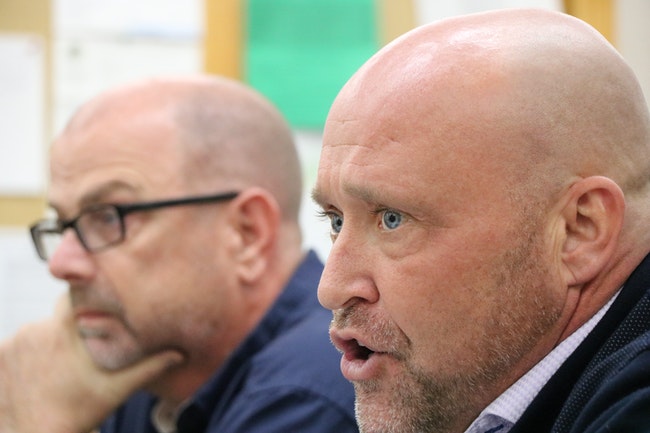 Greg Smith, Malheur County’s economic development director, talks to county commissioners at the Malheur County Courthouse on Wednesday, Dec. 11. Beside him is his assistant, John Braese. (The Enterprise/Joe Siess)
Greg Smith, Malheur County’s economic development director, talks to county commissioners at the Malheur County Courthouse on Wednesday, Dec. 11. Beside him is his assistant, John Braese. (The Enterprise/Joe Siess)
VALE – For the first time Wednesday the Malheur County Court explained to the public why it is set to pull taxpayer money out of the county budget to buy property north of Nyssa.
A large crowd gathered for the court’s regular session where they listened to Greg Smith, county economic development director, give Commissioners Don Hodge and Larry Wilson and County Judge Dan Joyce an update on the rail center project.
The Enterprise also live streamed the meeting over Facebook, where by Thursday morning it had collected more than 7,000 views.
Planned real estate transactions related to a proposed produce shipping operation came into sharp focus recently after an independent appraisal showed that the county intends to pay about $3 million for farmland valued at $2 million.
The land north of downtown Nyssa is projected as the base for the reload center and an industrial park that the county has pushed for more than two years. The project, originally advertised as a way to cut shipping costs for the local onion industry, is forecast to produce the equivalent of 16 full-time jobs.
State records obtained last week by the Enterprise show the county will dip into its reservoir of public money for nearly $1 million to close the deal on the property. Officials plan to take the $1 million from the county’s contingency fund, according to state records, which would cut in half what serves as the rainy-day account for emergencies and unexpected costs.
The county also received a $2.4 million loan from the state to help buy the land and seeks to qualify for a second state-funded economic development program that provides income tax reimbursements for businesses.
Hodge noted that if development goes as planned, the county would get back any money it put into the land.
“We will be whole,” Hodge said.
Repeated questions by the Enterprise to the court and to Smith to explain the real estate plan have been ignored but at the Wednesday session the motif of “build and they will come” took center stage.
The court and Smith indicated that the taxpayer-funded land purchase is about investing in the future.
“Public sector investment leads to private sector investment,” Smith said.
Smith noted that the land has “zero utilities, zero roads, zero rail spurs.” The state has agreed to fund some of that cost, but Smith didn’t address how the county would pay for the rest.
Smith sidestepped the appraisal issue on the piece of land commonly referred to as the Farmer Property, a 290-acre parcel valued at $2.050 million, where the rail center and business park are planned. The county already agreed to pay $3.019 for the parcel but Smith said that land’s value will climb in the future.
“As we begin to make investments, the value of the land will increase significantly,” he said.
He suggested the county would profit even if it sells the land in the future at a discount. He industrial buyers would appear who would pay $12,000 for developed property that is worth $20,000.
The land now is not developed and is mostly zoned industrial, though about 80 acres is reserved for farm use.
Smith said the county would repay the state loans several ways. He said a lease agreement between the county and an independent firm to operate the rail reload facility would provide cash to help pay down any debt. He also touted the $26 million investment from the state, leases or sales of property at the center and its adjacent business park as methods to pay down any county debt connected to the center.
Smith said, though, that the ability to upgrade the property will be key.
“The county can put the real estate up for sale with the improvements made at a significantly high price,” said Smith.
Vale resident Kathy Clarich asked Smith whether or not the real estate issue was land speculation.
“When the improvements are made that real estate is very different than the real estate of today. We’ll now have something to market,” said Smith.
Smith also said that negotiations with Americold, a national transportation and warehousing company, to run the Treasure Valley Reload Center indicates that onion producers could find new customers. He said the project could “open new markets that otherwise weren’t even thought about 24 months ago.”
SUBSCRIBE TO HELP PRODUCE VITAL REPORTING — For $5 a month, you get breaking news alerts, emailed newsletters and around-the-clock access to our stories. We depend on subscribers to pay for in-depth, accurate news produced by a professional and highly trained staff. Help us grow and get better with your subscription. Sign up HERE.




